Necessity of English for Academic Purpose: An Iraqi Case Study
VerifiedAdded on 2021/04/17
|44
|8915
|173
Report
AI Summary
This report investigates the necessity of English for academic purposes, particularly within Iraqi universities. The study explores the challenges international and regional students face due to language barriers, emphasizing the importance of applied linguistics in enhancing educational skills and qualifications. The research includes a literature review on adopting proper English dialects, factors affecting linguistic competence (non-linguistic, cultural, and economic barriers), and necessary ways to overcome these barriers. A research methodology involving 50 students from Iraqi universities is employed, utilizing questionnaires for data collection and MS Excel for statistical analysis. The findings highlight the impact of dialect issues on international students and the need for EAP programs. The report concludes with recommendations for overcoming linguistic barriers and suggests avenues for future research, underscoring the crucial role of English as a medium for global education and equal access to academic opportunities.
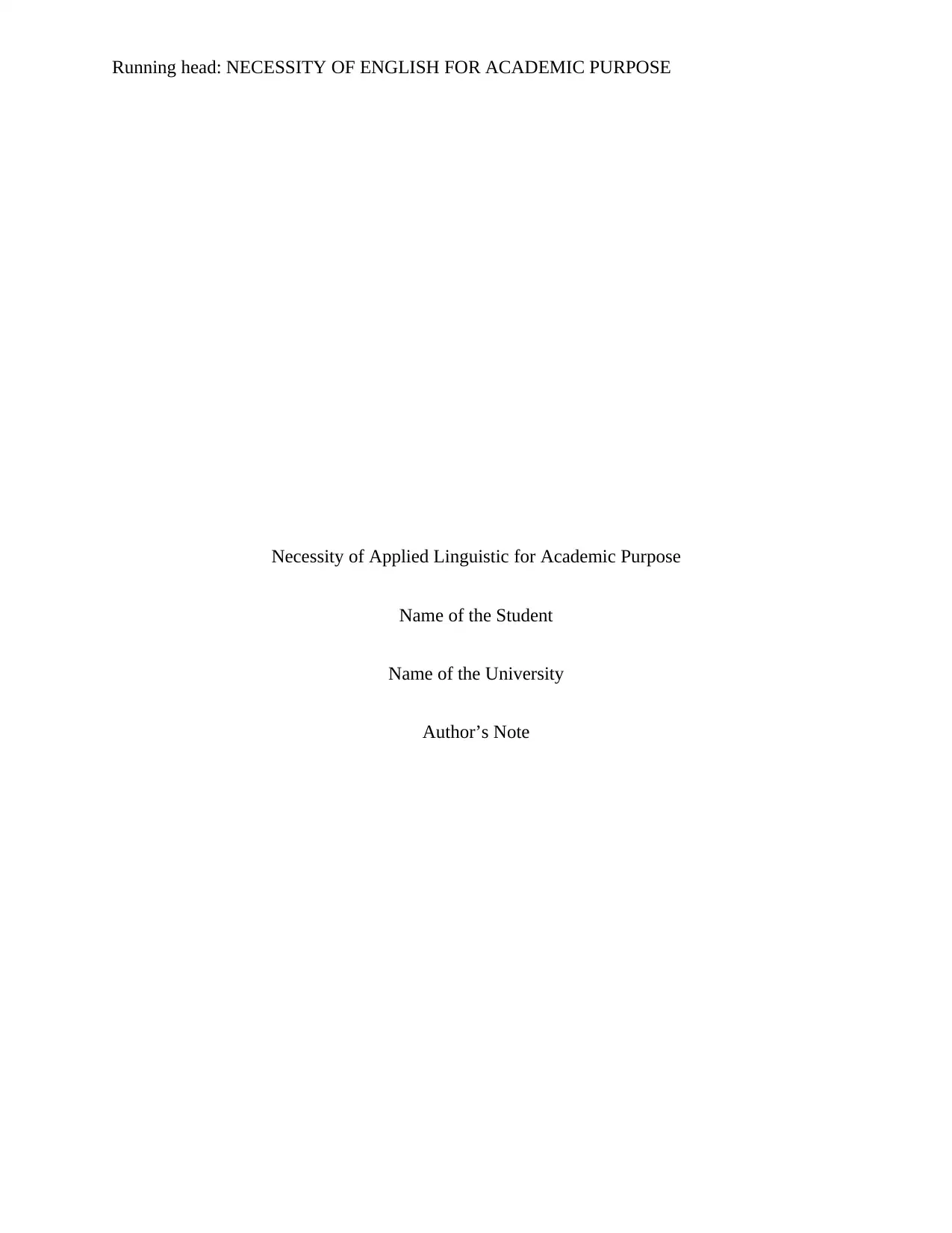
Running head: NECESSITY OF ENGLISH FOR ACADEMIC PURPOSE
Necessity of Applied Linguistic for Academic Purpose
Name of the Student
Name of the University
Author’s Note
Necessity of Applied Linguistic for Academic Purpose
Name of the Student
Name of the University
Author’s Note
Paraphrase This Document
Need a fresh take? Get an instant paraphrase of this document with our AI Paraphraser
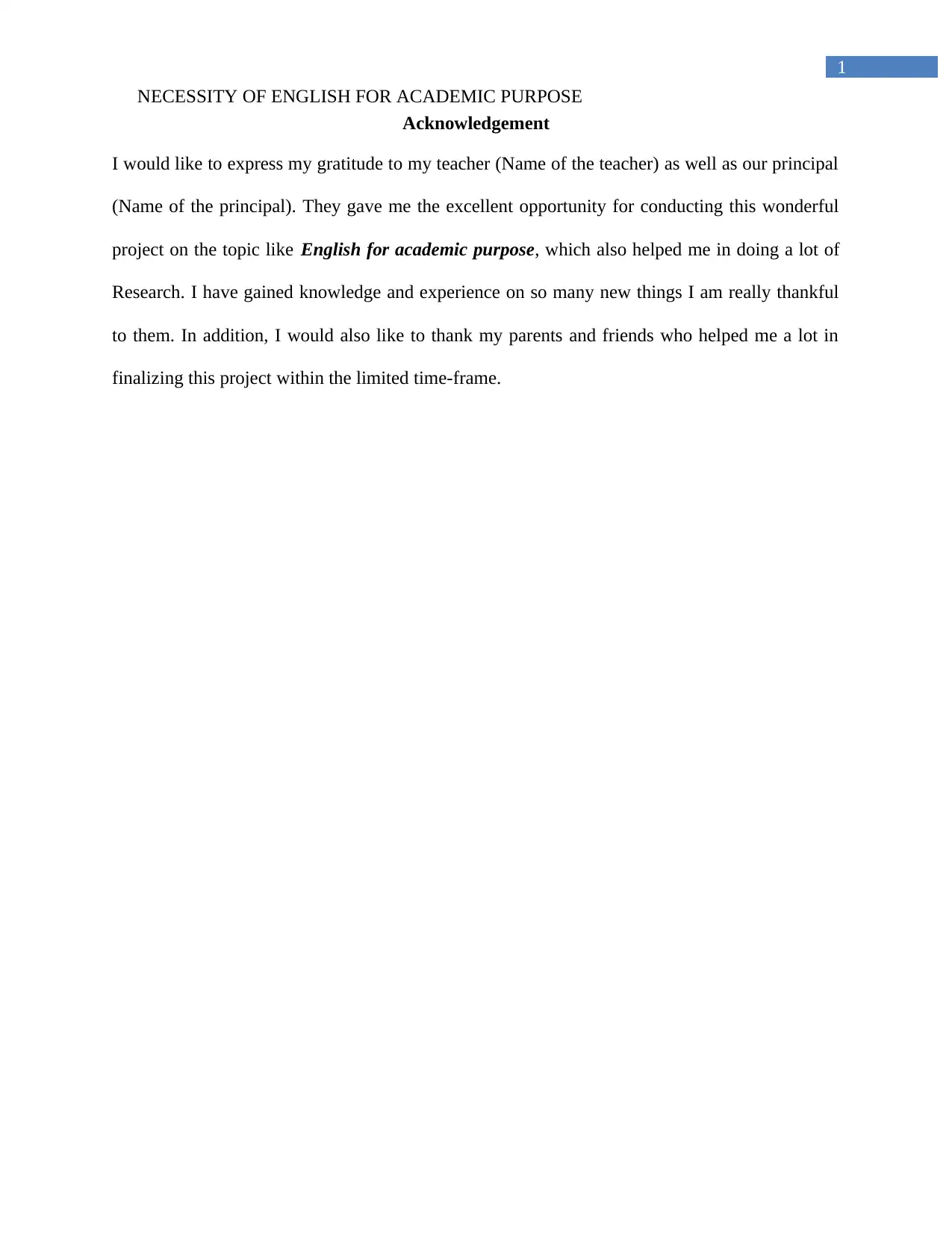
1
NECESSITY OF ENGLISH FOR ACADEMIC PURPOSE
Acknowledgement
I would like to express my gratitude to my teacher (Name of the teacher) as well as our principal
(Name of the principal). They gave me the excellent opportunity for conducting this wonderful
project on the topic like English for academic purpose, which also helped me in doing a lot of
Research. I have gained knowledge and experience on so many new things I am really thankful
to them. In addition, I would also like to thank my parents and friends who helped me a lot in
finalizing this project within the limited time-frame.
NECESSITY OF ENGLISH FOR ACADEMIC PURPOSE
Acknowledgement
I would like to express my gratitude to my teacher (Name of the teacher) as well as our principal
(Name of the principal). They gave me the excellent opportunity for conducting this wonderful
project on the topic like English for academic purpose, which also helped me in doing a lot of
Research. I have gained knowledge and experience on so many new things I am really thankful
to them. In addition, I would also like to thank my parents and friends who helped me a lot in
finalizing this project within the limited time-frame.
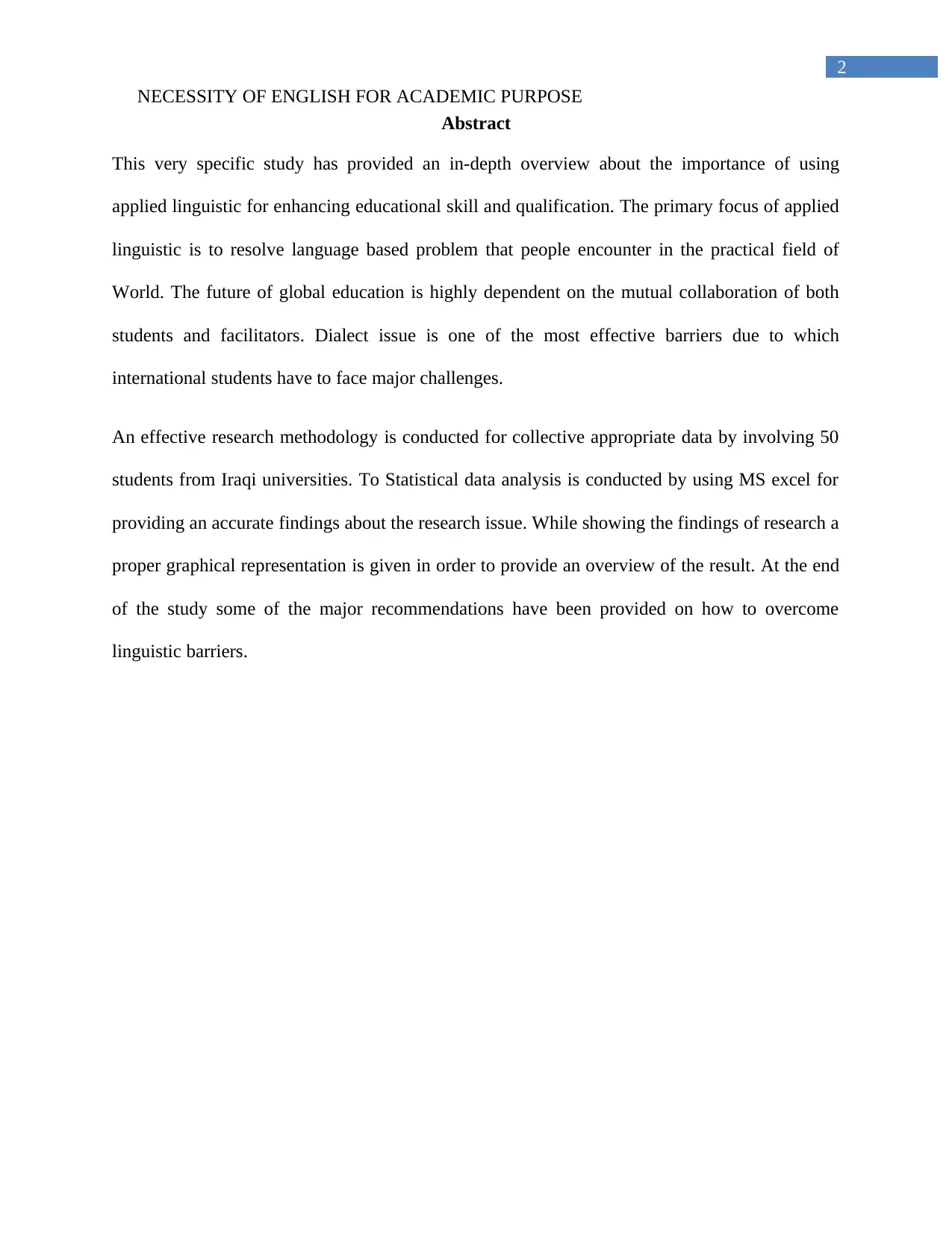
2
NECESSITY OF ENGLISH FOR ACADEMIC PURPOSE
Abstract
This very specific study has provided an in-depth overview about the importance of using
applied linguistic for enhancing educational skill and qualification. The primary focus of applied
linguistic is to resolve language based problem that people encounter in the practical field of
World. The future of global education is highly dependent on the mutual collaboration of both
students and facilitators. Dialect issue is one of the most effective barriers due to which
international students have to face major challenges.
An effective research methodology is conducted for collective appropriate data by involving 50
students from Iraqi universities. To Statistical data analysis is conducted by using MS excel for
providing an accurate findings about the research issue. While showing the findings of research a
proper graphical representation is given in order to provide an overview of the result. At the end
of the study some of the major recommendations have been provided on how to overcome
linguistic barriers.
NECESSITY OF ENGLISH FOR ACADEMIC PURPOSE
Abstract
This very specific study has provided an in-depth overview about the importance of using
applied linguistic for enhancing educational skill and qualification. The primary focus of applied
linguistic is to resolve language based problem that people encounter in the practical field of
World. The future of global education is highly dependent on the mutual collaboration of both
students and facilitators. Dialect issue is one of the most effective barriers due to which
international students have to face major challenges.
An effective research methodology is conducted for collective appropriate data by involving 50
students from Iraqi universities. To Statistical data analysis is conducted by using MS excel for
providing an accurate findings about the research issue. While showing the findings of research a
proper graphical representation is given in order to provide an overview of the result. At the end
of the study some of the major recommendations have been provided on how to overcome
linguistic barriers.
⊘ This is a preview!⊘
Do you want full access?
Subscribe today to unlock all pages.

Trusted by 1+ million students worldwide
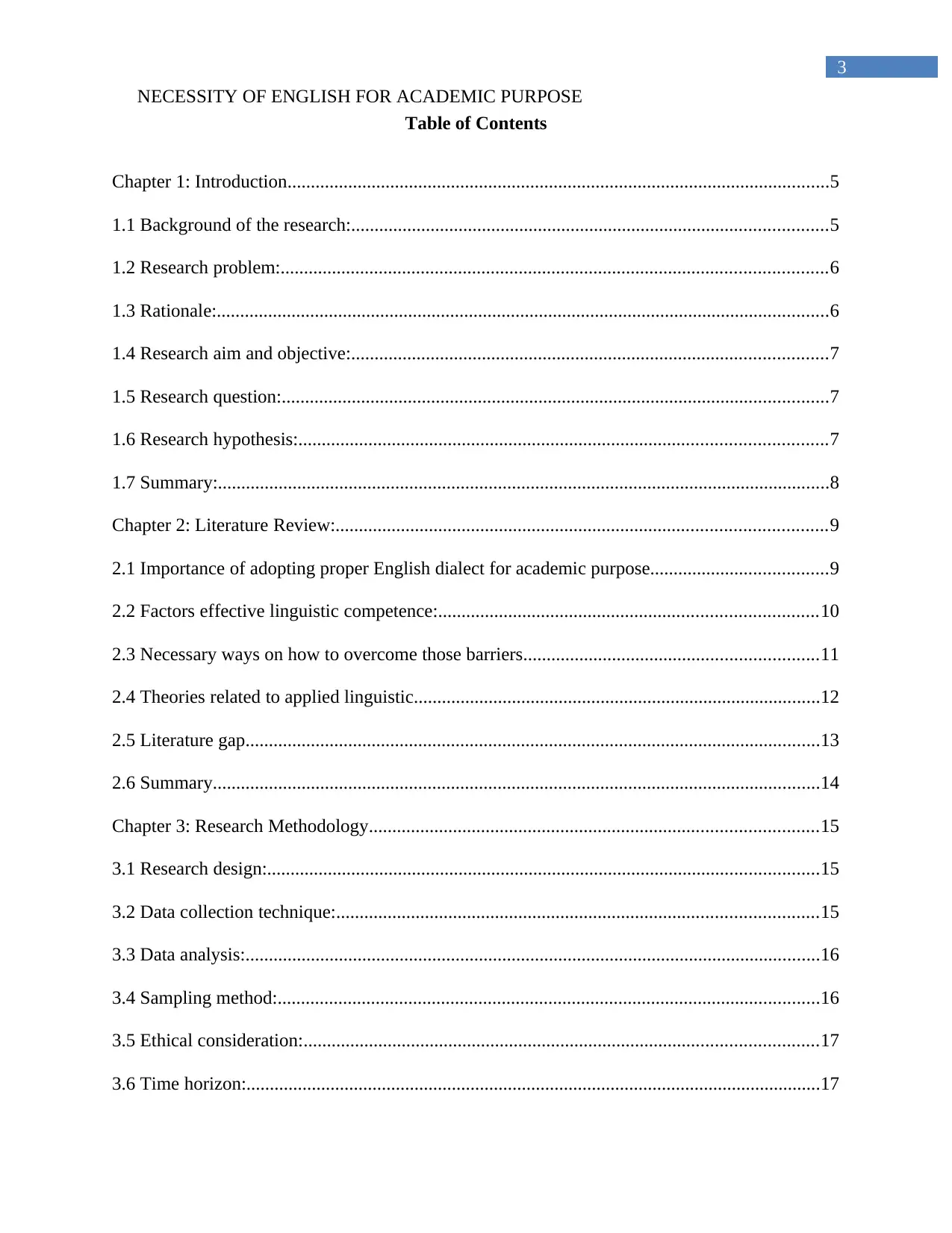
3
NECESSITY OF ENGLISH FOR ACADEMIC PURPOSE
Table of Contents
Chapter 1: Introduction....................................................................................................................5
1.1 Background of the research:......................................................................................................5
1.2 Research problem:.....................................................................................................................6
1.3 Rationale:...................................................................................................................................6
1.4 Research aim and objective:......................................................................................................7
1.5 Research question:.....................................................................................................................7
1.6 Research hypothesis:.................................................................................................................7
1.7 Summary:...................................................................................................................................8
Chapter 2: Literature Review:.........................................................................................................9
2.1 Importance of adopting proper English dialect for academic purpose......................................9
2.2 Factors effective linguistic competence:.................................................................................10
2.3 Necessary ways on how to overcome those barriers...............................................................11
2.4 Theories related to applied linguistic.......................................................................................12
2.5 Literature gap...........................................................................................................................13
2.6 Summary..................................................................................................................................14
Chapter 3: Research Methodology................................................................................................15
3.1 Research design:......................................................................................................................15
3.2 Data collection technique:.......................................................................................................15
3.3 Data analysis:...........................................................................................................................16
3.4 Sampling method:....................................................................................................................16
3.5 Ethical consideration:..............................................................................................................17
3.6 Time horizon:...........................................................................................................................17
NECESSITY OF ENGLISH FOR ACADEMIC PURPOSE
Table of Contents
Chapter 1: Introduction....................................................................................................................5
1.1 Background of the research:......................................................................................................5
1.2 Research problem:.....................................................................................................................6
1.3 Rationale:...................................................................................................................................6
1.4 Research aim and objective:......................................................................................................7
1.5 Research question:.....................................................................................................................7
1.6 Research hypothesis:.................................................................................................................7
1.7 Summary:...................................................................................................................................8
Chapter 2: Literature Review:.........................................................................................................9
2.1 Importance of adopting proper English dialect for academic purpose......................................9
2.2 Factors effective linguistic competence:.................................................................................10
2.3 Necessary ways on how to overcome those barriers...............................................................11
2.4 Theories related to applied linguistic.......................................................................................12
2.5 Literature gap...........................................................................................................................13
2.6 Summary..................................................................................................................................14
Chapter 3: Research Methodology................................................................................................15
3.1 Research design:......................................................................................................................15
3.2 Data collection technique:.......................................................................................................15
3.3 Data analysis:...........................................................................................................................16
3.4 Sampling method:....................................................................................................................16
3.5 Ethical consideration:..............................................................................................................17
3.6 Time horizon:...........................................................................................................................17
Paraphrase This Document
Need a fresh take? Get an instant paraphrase of this document with our AI Paraphraser
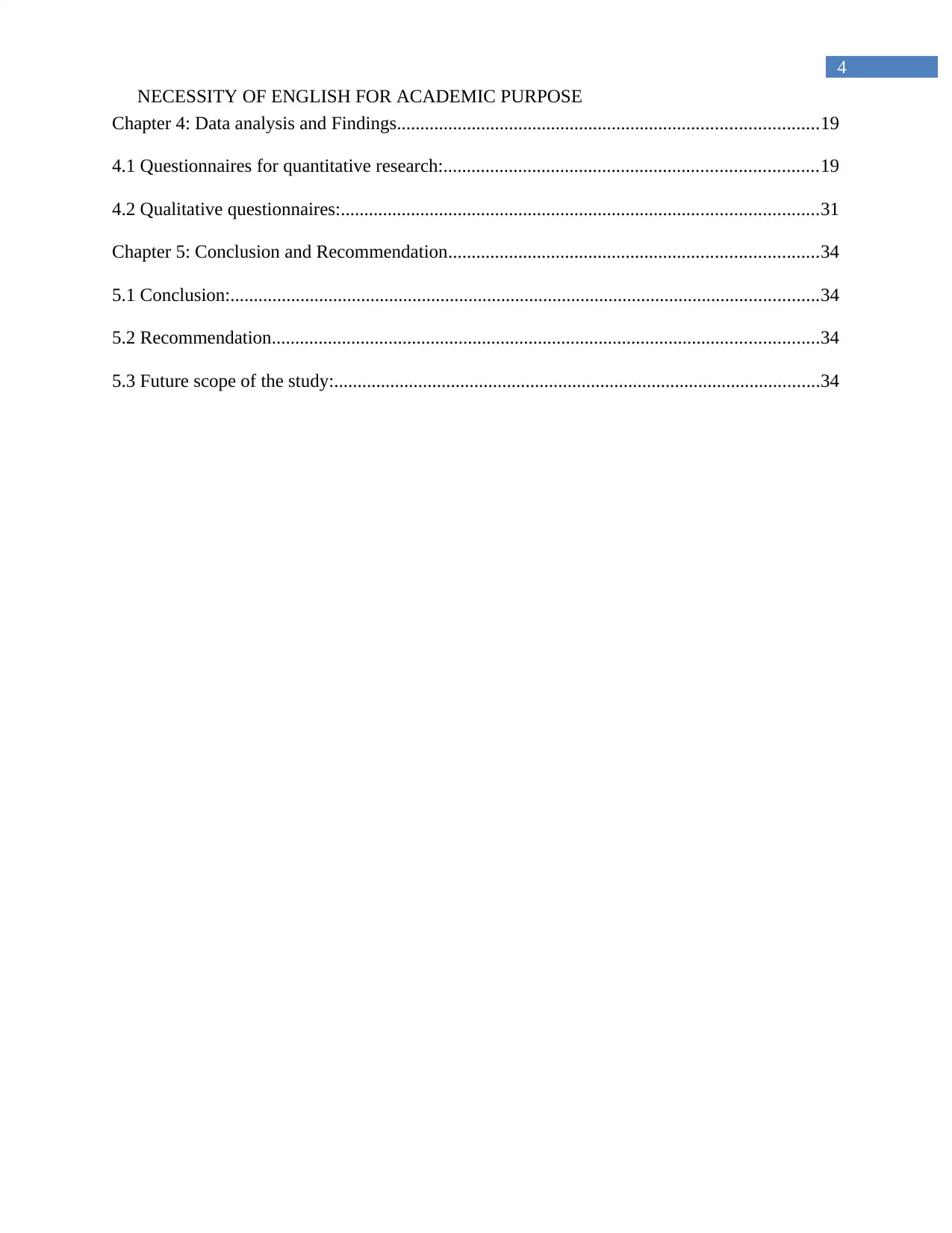
4
NECESSITY OF ENGLISH FOR ACADEMIC PURPOSE
Chapter 4: Data analysis and Findings..........................................................................................19
4.1 Questionnaires for quantitative research:................................................................................19
4.2 Qualitative questionnaires:......................................................................................................31
Chapter 5: Conclusion and Recommendation...............................................................................34
5.1 Conclusion:..............................................................................................................................34
5.2 Recommendation.....................................................................................................................34
5.3 Future scope of the study:........................................................................................................34
NECESSITY OF ENGLISH FOR ACADEMIC PURPOSE
Chapter 4: Data analysis and Findings..........................................................................................19
4.1 Questionnaires for quantitative research:................................................................................19
4.2 Qualitative questionnaires:......................................................................................................31
Chapter 5: Conclusion and Recommendation...............................................................................34
5.1 Conclusion:..............................................................................................................................34
5.2 Recommendation.....................................................................................................................34
5.3 Future scope of the study:........................................................................................................34
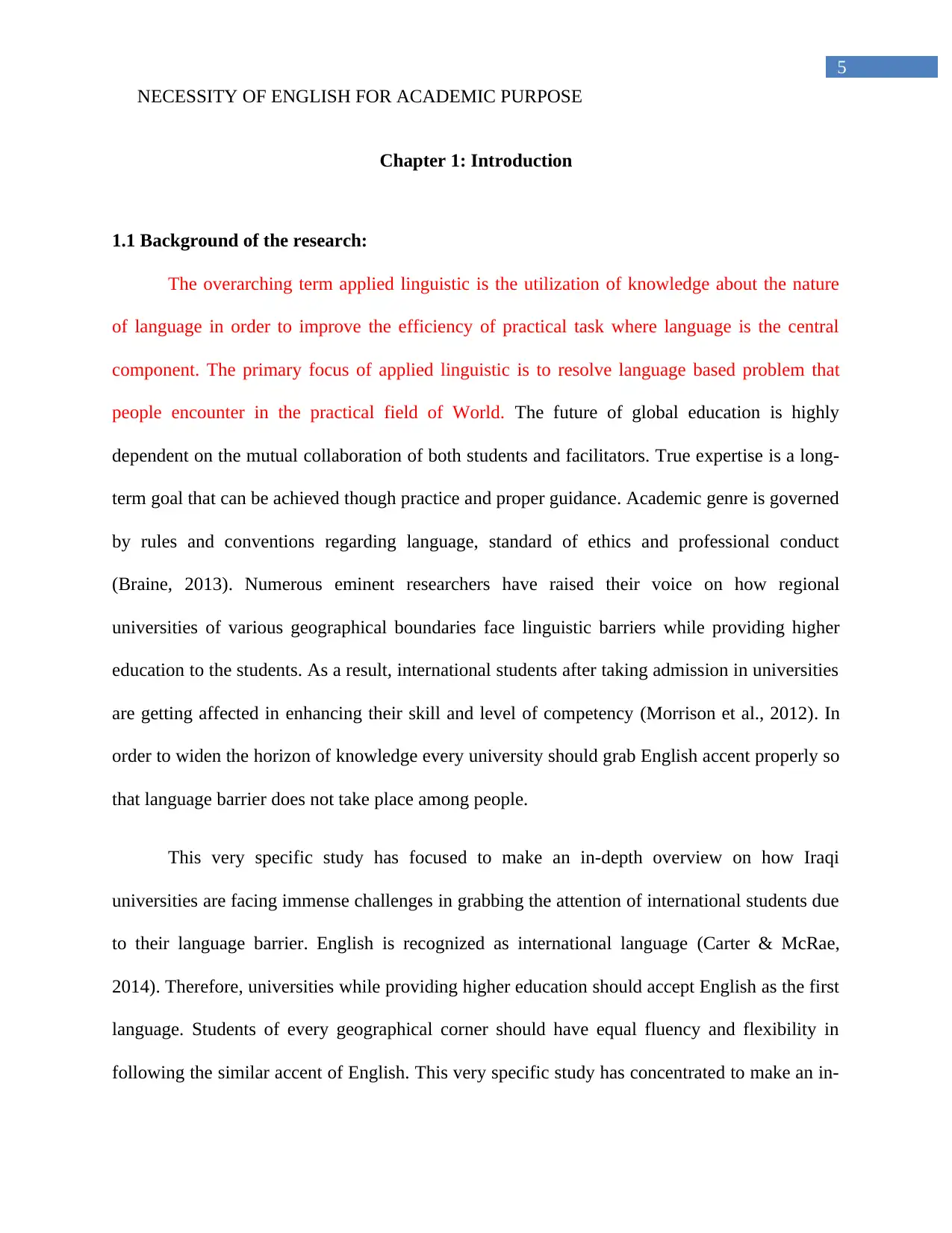
5
NECESSITY OF ENGLISH FOR ACADEMIC PURPOSE
Chapter 1: Introduction
1.1 Background of the research:
The overarching term applied linguistic is the utilization of knowledge about the nature
of language in order to improve the efficiency of practical task where language is the central
component. The primary focus of applied linguistic is to resolve language based problem that
people encounter in the practical field of World. The future of global education is highly
dependent on the mutual collaboration of both students and facilitators. True expertise is a long-
term goal that can be achieved though practice and proper guidance. Academic genre is governed
by rules and conventions regarding language, standard of ethics and professional conduct
(Braine, 2013). Numerous eminent researchers have raised their voice on how regional
universities of various geographical boundaries face linguistic barriers while providing higher
education to the students. As a result, international students after taking admission in universities
are getting affected in enhancing their skill and level of competency (Morrison et al., 2012). In
order to widen the horizon of knowledge every university should grab English accent properly so
that language barrier does not take place among people.
This very specific study has focused to make an in-depth overview on how Iraqi
universities are facing immense challenges in grabbing the attention of international students due
to their language barrier. English is recognized as international language (Carter & McRae,
2014). Therefore, universities while providing higher education should accept English as the first
language. Students of every geographical corner should have equal fluency and flexibility in
following the similar accent of English. This very specific study has concentrated to make an in-
NECESSITY OF ENGLISH FOR ACADEMIC PURPOSE
Chapter 1: Introduction
1.1 Background of the research:
The overarching term applied linguistic is the utilization of knowledge about the nature
of language in order to improve the efficiency of practical task where language is the central
component. The primary focus of applied linguistic is to resolve language based problem that
people encounter in the practical field of World. The future of global education is highly
dependent on the mutual collaboration of both students and facilitators. True expertise is a long-
term goal that can be achieved though practice and proper guidance. Academic genre is governed
by rules and conventions regarding language, standard of ethics and professional conduct
(Braine, 2013). Numerous eminent researchers have raised their voice on how regional
universities of various geographical boundaries face linguistic barriers while providing higher
education to the students. As a result, international students after taking admission in universities
are getting affected in enhancing their skill and level of competency (Morrison et al., 2012). In
order to widen the horizon of knowledge every university should grab English accent properly so
that language barrier does not take place among people.
This very specific study has focused to make an in-depth overview on how Iraqi
universities are facing immense challenges in grabbing the attention of international students due
to their language barrier. English is recognized as international language (Carter & McRae,
2014). Therefore, universities while providing higher education should accept English as the first
language. Students of every geographical corner should have equal fluency and flexibility in
following the similar accent of English. This very specific study has concentrated to make an in-
⊘ This is a preview!⊘
Do you want full access?
Subscribe today to unlock all pages.

Trusted by 1+ million students worldwide
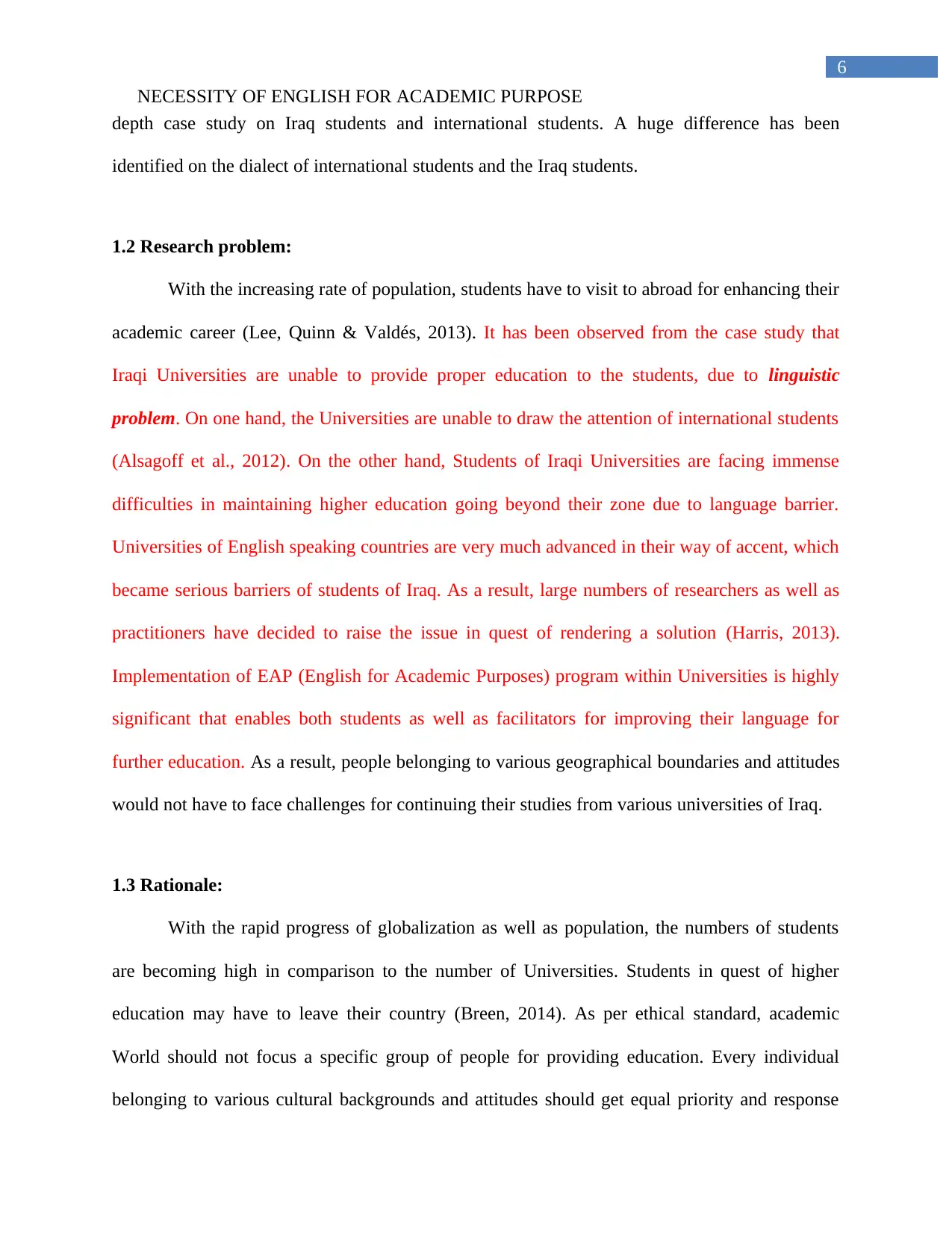
6
NECESSITY OF ENGLISH FOR ACADEMIC PURPOSE
depth case study on Iraq students and international students. A huge difference has been
identified on the dialect of international students and the Iraq students.
1.2 Research problem:
With the increasing rate of population, students have to visit to abroad for enhancing their
academic career (Lee, Quinn & Valdés, 2013). It has been observed from the case study that
Iraqi Universities are unable to provide proper education to the students, due to linguistic
problem. On one hand, the Universities are unable to draw the attention of international students
(Alsagoff et al., 2012). On the other hand, Students of Iraqi Universities are facing immense
difficulties in maintaining higher education going beyond their zone due to language barrier.
Universities of English speaking countries are very much advanced in their way of accent, which
became serious barriers of students of Iraq. As a result, large numbers of researchers as well as
practitioners have decided to raise the issue in quest of rendering a solution (Harris, 2013).
Implementation of EAP (English for Academic Purposes) program within Universities is highly
significant that enables both students as well as facilitators for improving their language for
further education. As a result, people belonging to various geographical boundaries and attitudes
would not have to face challenges for continuing their studies from various universities of Iraq.
1.3 Rationale:
With the rapid progress of globalization as well as population, the numbers of students
are becoming high in comparison to the number of Universities. Students in quest of higher
education may have to leave their country (Breen, 2014). As per ethical standard, academic
World should not focus a specific group of people for providing education. Every individual
belonging to various cultural backgrounds and attitudes should get equal priority and response
NECESSITY OF ENGLISH FOR ACADEMIC PURPOSE
depth case study on Iraq students and international students. A huge difference has been
identified on the dialect of international students and the Iraq students.
1.2 Research problem:
With the increasing rate of population, students have to visit to abroad for enhancing their
academic career (Lee, Quinn & Valdés, 2013). It has been observed from the case study that
Iraqi Universities are unable to provide proper education to the students, due to linguistic
problem. On one hand, the Universities are unable to draw the attention of international students
(Alsagoff et al., 2012). On the other hand, Students of Iraqi Universities are facing immense
difficulties in maintaining higher education going beyond their zone due to language barrier.
Universities of English speaking countries are very much advanced in their way of accent, which
became serious barriers of students of Iraq. As a result, large numbers of researchers as well as
practitioners have decided to raise the issue in quest of rendering a solution (Harris, 2013).
Implementation of EAP (English for Academic Purposes) program within Universities is highly
significant that enables both students as well as facilitators for improving their language for
further education. As a result, people belonging to various geographical boundaries and attitudes
would not have to face challenges for continuing their studies from various universities of Iraq.
1.3 Rationale:
With the rapid progress of globalization as well as population, the numbers of students
are becoming high in comparison to the number of Universities. Students in quest of higher
education may have to leave their country (Breen, 2014). As per ethical standard, academic
World should not focus a specific group of people for providing education. Every individual
belonging to various cultural backgrounds and attitudes should get equal priority and response
Paraphrase This Document
Need a fresh take? Get an instant paraphrase of this document with our AI Paraphraser
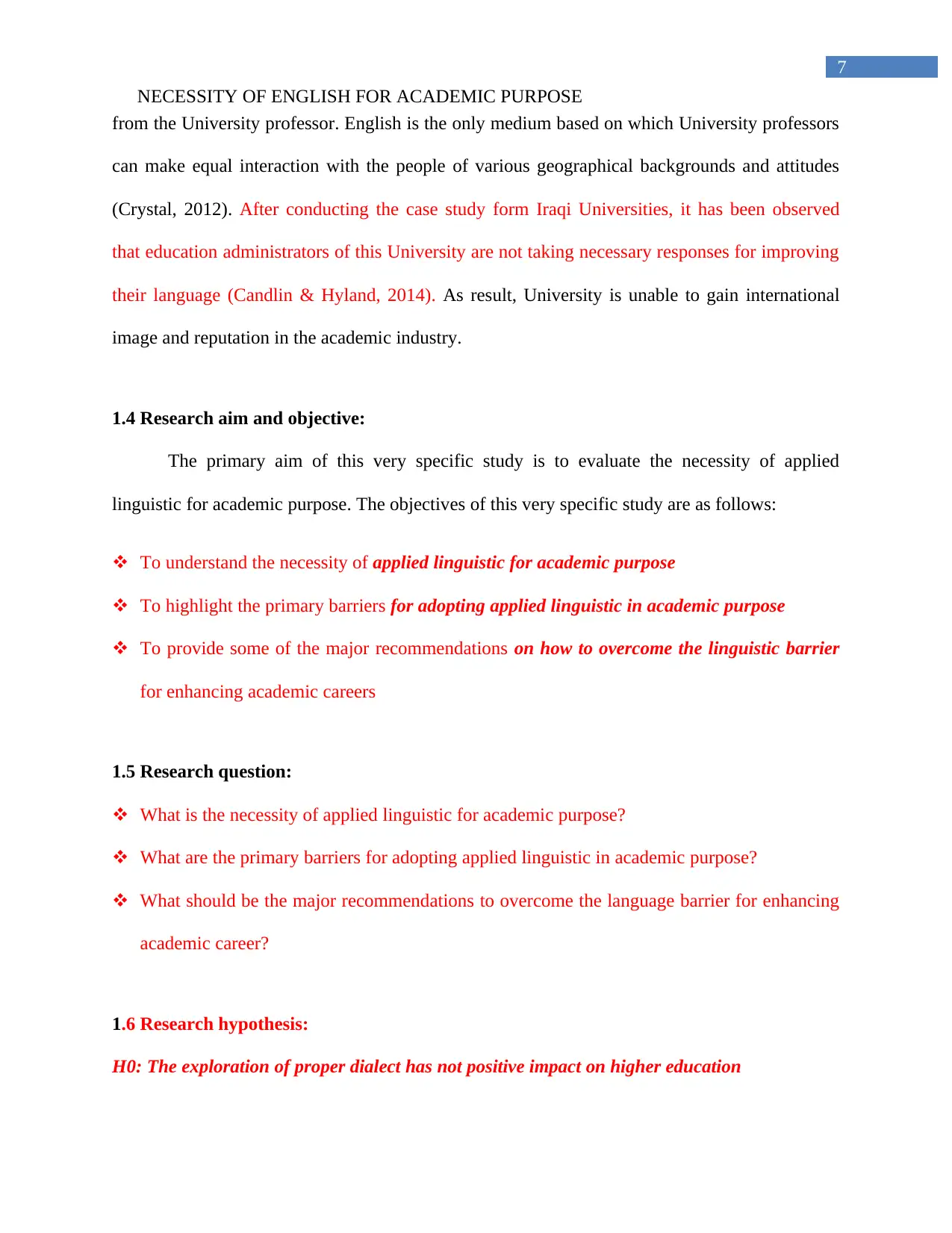
7
NECESSITY OF ENGLISH FOR ACADEMIC PURPOSE
from the University professor. English is the only medium based on which University professors
can make equal interaction with the people of various geographical backgrounds and attitudes
(Crystal, 2012). After conducting the case study form Iraqi Universities, it has been observed
that education administrators of this University are not taking necessary responses for improving
their language (Candlin & Hyland, 2014). As result, University is unable to gain international
image and reputation in the academic industry.
1.4 Research aim and objective:
The primary aim of this very specific study is to evaluate the necessity of applied
linguistic for academic purpose. The objectives of this very specific study are as follows:
To understand the necessity of applied linguistic for academic purpose
To highlight the primary barriers for adopting applied linguistic in academic purpose
To provide some of the major recommendations on how to overcome the linguistic barrier
for enhancing academic careers
1.5 Research question:
What is the necessity of applied linguistic for academic purpose?
What are the primary barriers for adopting applied linguistic in academic purpose?
What should be the major recommendations to overcome the language barrier for enhancing
academic career?
1.6 Research hypothesis:
H0: The exploration of proper dialect has not positive impact on higher education
NECESSITY OF ENGLISH FOR ACADEMIC PURPOSE
from the University professor. English is the only medium based on which University professors
can make equal interaction with the people of various geographical backgrounds and attitudes
(Crystal, 2012). After conducting the case study form Iraqi Universities, it has been observed
that education administrators of this University are not taking necessary responses for improving
their language (Candlin & Hyland, 2014). As result, University is unable to gain international
image and reputation in the academic industry.
1.4 Research aim and objective:
The primary aim of this very specific study is to evaluate the necessity of applied
linguistic for academic purpose. The objectives of this very specific study are as follows:
To understand the necessity of applied linguistic for academic purpose
To highlight the primary barriers for adopting applied linguistic in academic purpose
To provide some of the major recommendations on how to overcome the linguistic barrier
for enhancing academic careers
1.5 Research question:
What is the necessity of applied linguistic for academic purpose?
What are the primary barriers for adopting applied linguistic in academic purpose?
What should be the major recommendations to overcome the language barrier for enhancing
academic career?
1.6 Research hypothesis:
H0: The exploration of proper dialect has not positive impact on higher education
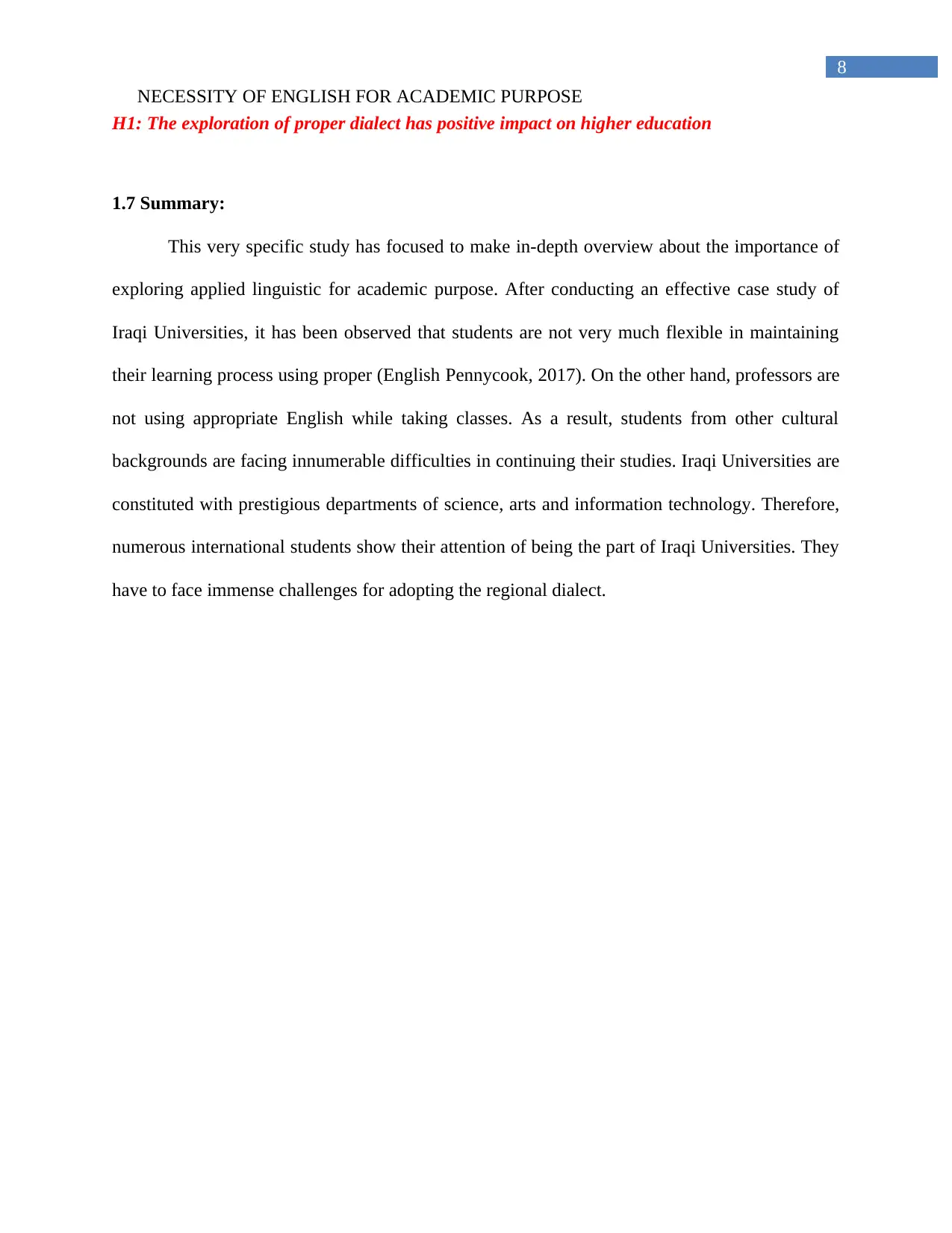
8
NECESSITY OF ENGLISH FOR ACADEMIC PURPOSE
H1: The exploration of proper dialect has positive impact on higher education
1.7 Summary:
This very specific study has focused to make in-depth overview about the importance of
exploring applied linguistic for academic purpose. After conducting an effective case study of
Iraqi Universities, it has been observed that students are not very much flexible in maintaining
their learning process using proper (English Pennycook, 2017). On the other hand, professors are
not using appropriate English while taking classes. As a result, students from other cultural
backgrounds are facing innumerable difficulties in continuing their studies. Iraqi Universities are
constituted with prestigious departments of science, arts and information technology. Therefore,
numerous international students show their attention of being the part of Iraqi Universities. They
have to face immense challenges for adopting the regional dialect.
NECESSITY OF ENGLISH FOR ACADEMIC PURPOSE
H1: The exploration of proper dialect has positive impact on higher education
1.7 Summary:
This very specific study has focused to make in-depth overview about the importance of
exploring applied linguistic for academic purpose. After conducting an effective case study of
Iraqi Universities, it has been observed that students are not very much flexible in maintaining
their learning process using proper (English Pennycook, 2017). On the other hand, professors are
not using appropriate English while taking classes. As a result, students from other cultural
backgrounds are facing innumerable difficulties in continuing their studies. Iraqi Universities are
constituted with prestigious departments of science, arts and information technology. Therefore,
numerous international students show their attention of being the part of Iraqi Universities. They
have to face immense challenges for adopting the regional dialect.
⊘ This is a preview!⊘
Do you want full access?
Subscribe today to unlock all pages.

Trusted by 1+ million students worldwide
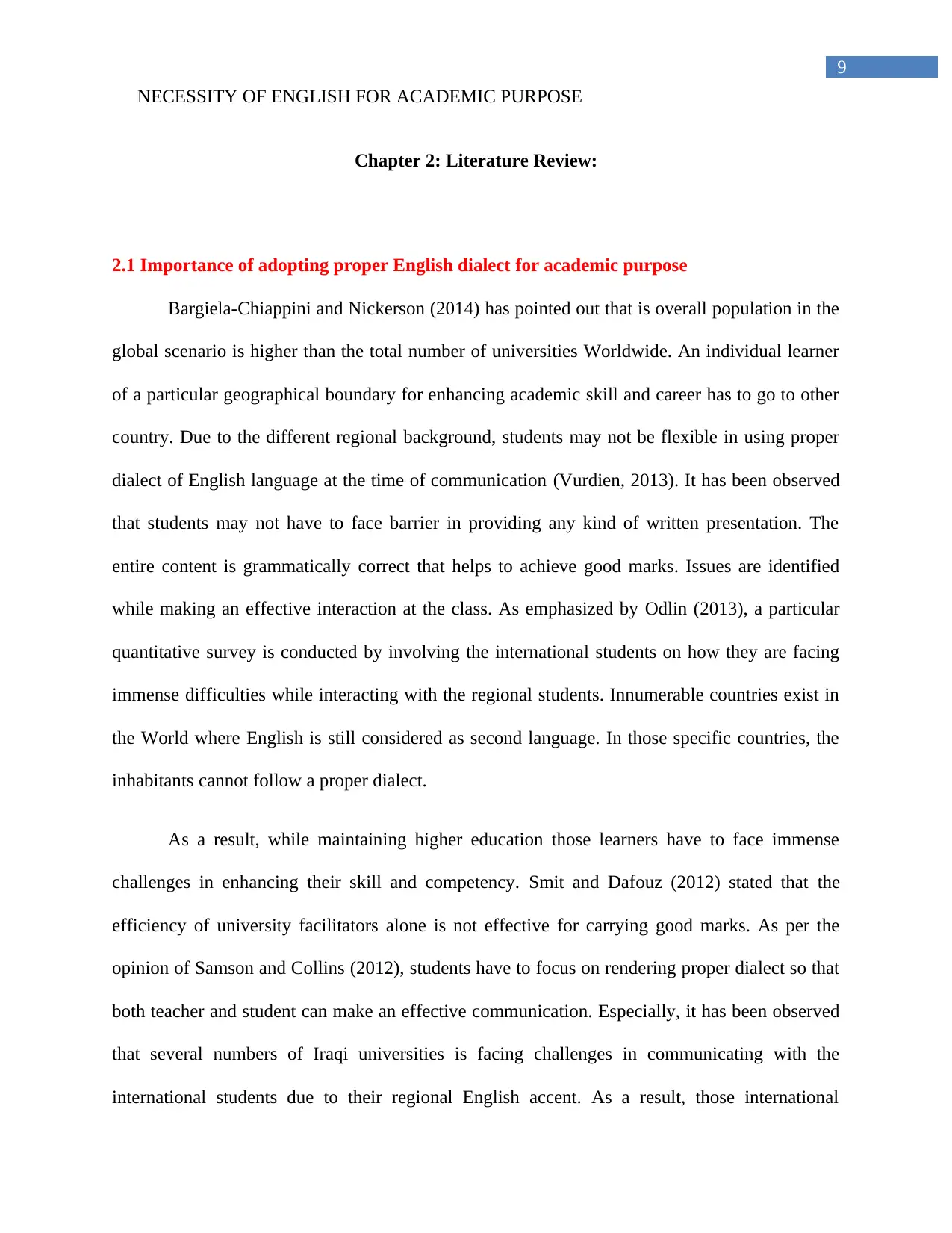
9
NECESSITY OF ENGLISH FOR ACADEMIC PURPOSE
Chapter 2: Literature Review:
2.1 Importance of adopting proper English dialect for academic purpose
Bargiela-Chiappini and Nickerson (2014) has pointed out that is overall population in the
global scenario is higher than the total number of universities Worldwide. An individual learner
of a particular geographical boundary for enhancing academic skill and career has to go to other
country. Due to the different regional background, students may not be flexible in using proper
dialect of English language at the time of communication (Vurdien, 2013). It has been observed
that students may not have to face barrier in providing any kind of written presentation. The
entire content is grammatically correct that helps to achieve good marks. Issues are identified
while making an effective interaction at the class. As emphasized by Odlin (2013), a particular
quantitative survey is conducted by involving the international students on how they are facing
immense difficulties while interacting with the regional students. Innumerable countries exist in
the World where English is still considered as second language. In those specific countries, the
inhabitants cannot follow a proper dialect.
As a result, while maintaining higher education those learners have to face immense
challenges in enhancing their skill and competency. Smit and Dafouz (2012) stated that the
efficiency of university facilitators alone is not effective for carrying good marks. As per the
opinion of Samson and Collins (2012), students have to focus on rendering proper dialect so that
both teacher and student can make an effective communication. Especially, it has been observed
that several numbers of Iraqi universities is facing challenges in communicating with the
international students due to their regional English accent. As a result, those international
NECESSITY OF ENGLISH FOR ACADEMIC PURPOSE
Chapter 2: Literature Review:
2.1 Importance of adopting proper English dialect for academic purpose
Bargiela-Chiappini and Nickerson (2014) has pointed out that is overall population in the
global scenario is higher than the total number of universities Worldwide. An individual learner
of a particular geographical boundary for enhancing academic skill and career has to go to other
country. Due to the different regional background, students may not be flexible in using proper
dialect of English language at the time of communication (Vurdien, 2013). It has been observed
that students may not have to face barrier in providing any kind of written presentation. The
entire content is grammatically correct that helps to achieve good marks. Issues are identified
while making an effective interaction at the class. As emphasized by Odlin (2013), a particular
quantitative survey is conducted by involving the international students on how they are facing
immense difficulties while interacting with the regional students. Innumerable countries exist in
the World where English is still considered as second language. In those specific countries, the
inhabitants cannot follow a proper dialect.
As a result, while maintaining higher education those learners have to face immense
challenges in enhancing their skill and competency. Smit and Dafouz (2012) stated that the
efficiency of university facilitators alone is not effective for carrying good marks. As per the
opinion of Samson and Collins (2012), students have to focus on rendering proper dialect so that
both teacher and student can make an effective communication. Especially, it has been observed
that several numbers of Iraqi universities is facing challenges in communicating with the
international students due to their regional English accent. As a result, those international
Paraphrase This Document
Need a fresh take? Get an instant paraphrase of this document with our AI Paraphraser
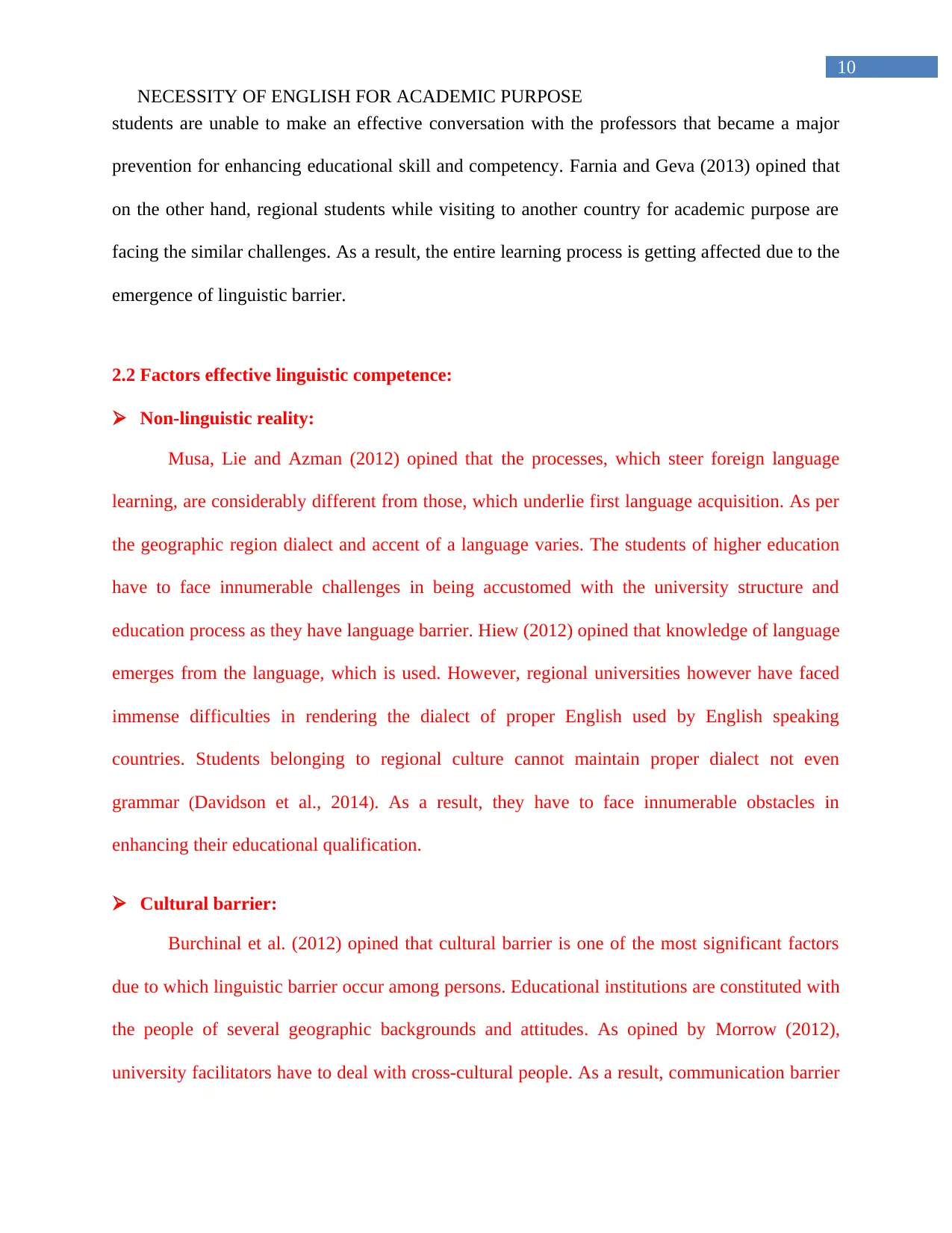
10
NECESSITY OF ENGLISH FOR ACADEMIC PURPOSE
students are unable to make an effective conversation with the professors that became a major
prevention for enhancing educational skill and competency. Farnia and Geva (2013) opined that
on the other hand, regional students while visiting to another country for academic purpose are
facing the similar challenges. As a result, the entire learning process is getting affected due to the
emergence of linguistic barrier.
2.2 Factors effective linguistic competence:
Non-linguistic reality:
Musa, Lie and Azman (2012) opined that the processes, which steer foreign language
learning, are considerably different from those, which underlie first language acquisition. As per
the geographic region dialect and accent of a language varies. The students of higher education
have to face innumerable challenges in being accustomed with the university structure and
education process as they have language barrier. Hiew (2012) opined that knowledge of language
emerges from the language, which is used. However, regional universities however have faced
immense difficulties in rendering the dialect of proper English used by English speaking
countries. Students belonging to regional culture cannot maintain proper dialect not even
grammar (Davidson et al., 2014). As a result, they have to face innumerable obstacles in
enhancing their educational qualification.
Cultural barrier:
Burchinal et al. (2012) opined that cultural barrier is one of the most significant factors
due to which linguistic barrier occur among persons. Educational institutions are constituted with
the people of several geographic backgrounds and attitudes. As opined by Morrow (2012),
university facilitators have to deal with cross-cultural people. As a result, communication barrier
NECESSITY OF ENGLISH FOR ACADEMIC PURPOSE
students are unable to make an effective conversation with the professors that became a major
prevention for enhancing educational skill and competency. Farnia and Geva (2013) opined that
on the other hand, regional students while visiting to another country for academic purpose are
facing the similar challenges. As a result, the entire learning process is getting affected due to the
emergence of linguistic barrier.
2.2 Factors effective linguistic competence:
Non-linguistic reality:
Musa, Lie and Azman (2012) opined that the processes, which steer foreign language
learning, are considerably different from those, which underlie first language acquisition. As per
the geographic region dialect and accent of a language varies. The students of higher education
have to face innumerable challenges in being accustomed with the university structure and
education process as they have language barrier. Hiew (2012) opined that knowledge of language
emerges from the language, which is used. However, regional universities however have faced
immense difficulties in rendering the dialect of proper English used by English speaking
countries. Students belonging to regional culture cannot maintain proper dialect not even
grammar (Davidson et al., 2014). As a result, they have to face innumerable obstacles in
enhancing their educational qualification.
Cultural barrier:
Burchinal et al. (2012) opined that cultural barrier is one of the most significant factors
due to which linguistic barrier occur among persons. Educational institutions are constituted with
the people of several geographic backgrounds and attitudes. As opined by Morrow (2012),
university facilitators have to deal with cross-cultural people. As a result, communication barrier
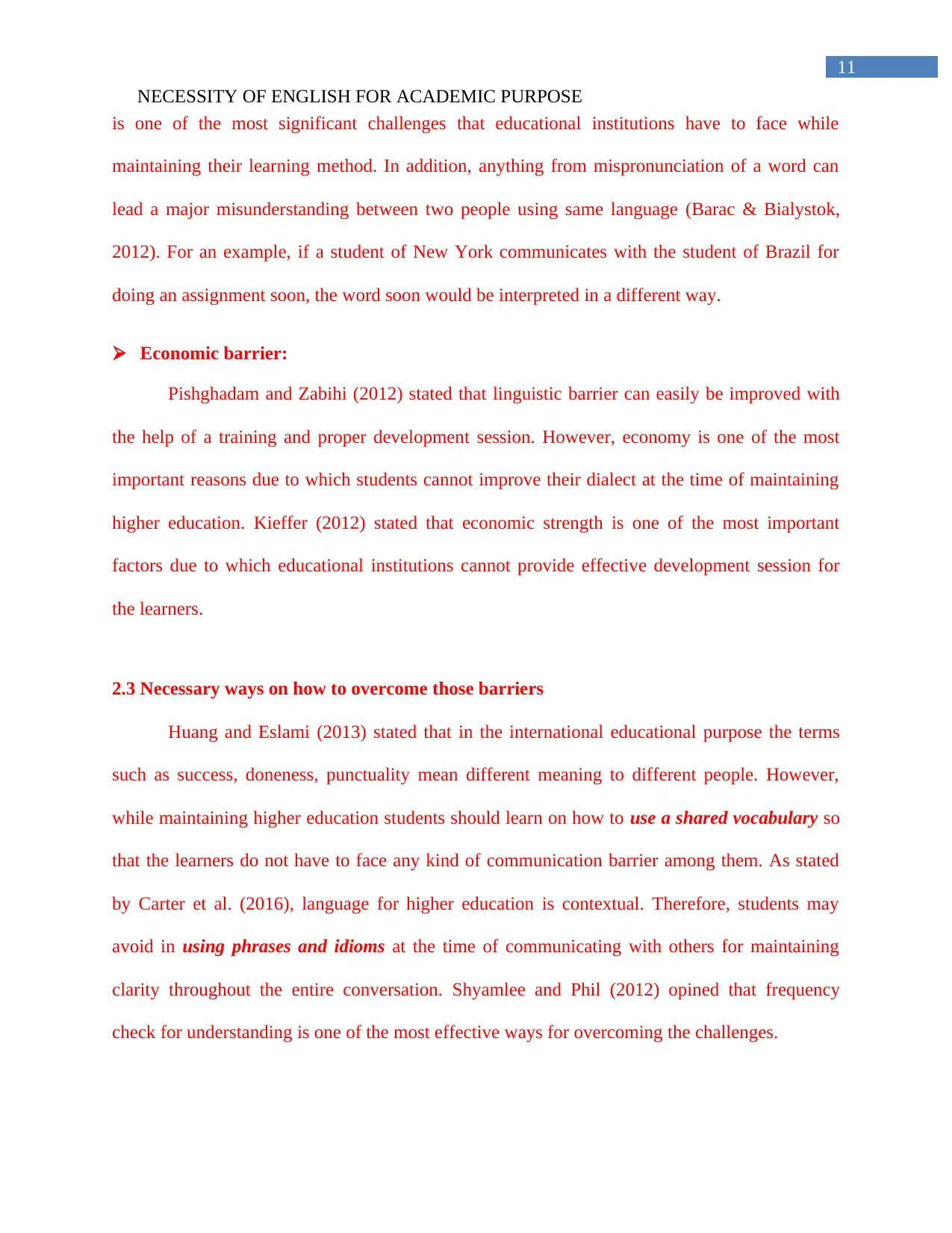
11
NECESSITY OF ENGLISH FOR ACADEMIC PURPOSE
is one of the most significant challenges that educational institutions have to face while
maintaining their learning method. In addition, anything from mispronunciation of a word can
lead a major misunderstanding between two people using same language (Barac & Bialystok,
2012). For an example, if a student of New York communicates with the student of Brazil for
doing an assignment soon, the word soon would be interpreted in a different way.
Economic barrier:
Pishghadam and Zabihi (2012) stated that linguistic barrier can easily be improved with
the help of a training and proper development session. However, economy is one of the most
important reasons due to which students cannot improve their dialect at the time of maintaining
higher education. Kieffer (2012) stated that economic strength is one of the most important
factors due to which educational institutions cannot provide effective development session for
the learners.
2.3 Necessary ways on how to overcome those barriers
Huang and Eslami (2013) stated that in the international educational purpose the terms
such as success, doneness, punctuality mean different meaning to different people. However,
while maintaining higher education students should learn on how to use a shared vocabulary so
that the learners do not have to face any kind of communication barrier among them. As stated
by Carter et al. (2016), language for higher education is contextual. Therefore, students may
avoid in using phrases and idioms at the time of communicating with others for maintaining
clarity throughout the entire conversation. Shyamlee and Phil (2012) opined that frequency
check for understanding is one of the most effective ways for overcoming the challenges.
NECESSITY OF ENGLISH FOR ACADEMIC PURPOSE
is one of the most significant challenges that educational institutions have to face while
maintaining their learning method. In addition, anything from mispronunciation of a word can
lead a major misunderstanding between two people using same language (Barac & Bialystok,
2012). For an example, if a student of New York communicates with the student of Brazil for
doing an assignment soon, the word soon would be interpreted in a different way.
Economic barrier:
Pishghadam and Zabihi (2012) stated that linguistic barrier can easily be improved with
the help of a training and proper development session. However, economy is one of the most
important reasons due to which students cannot improve their dialect at the time of maintaining
higher education. Kieffer (2012) stated that economic strength is one of the most important
factors due to which educational institutions cannot provide effective development session for
the learners.
2.3 Necessary ways on how to overcome those barriers
Huang and Eslami (2013) stated that in the international educational purpose the terms
such as success, doneness, punctuality mean different meaning to different people. However,
while maintaining higher education students should learn on how to use a shared vocabulary so
that the learners do not have to face any kind of communication barrier among them. As stated
by Carter et al. (2016), language for higher education is contextual. Therefore, students may
avoid in using phrases and idioms at the time of communicating with others for maintaining
clarity throughout the entire conversation. Shyamlee and Phil (2012) opined that frequency
check for understanding is one of the most effective ways for overcoming the challenges.
⊘ This is a preview!⊘
Do you want full access?
Subscribe today to unlock all pages.

Trusted by 1+ million students worldwide
1 out of 44
Related Documents
Your All-in-One AI-Powered Toolkit for Academic Success.
+13062052269
info@desklib.com
Available 24*7 on WhatsApp / Email
![[object Object]](/_next/static/media/star-bottom.7253800d.svg)
Unlock your academic potential
Copyright © 2020–2026 A2Z Services. All Rights Reserved. Developed and managed by ZUCOL.





